Qbank for the MCCQE Part 1 Exam
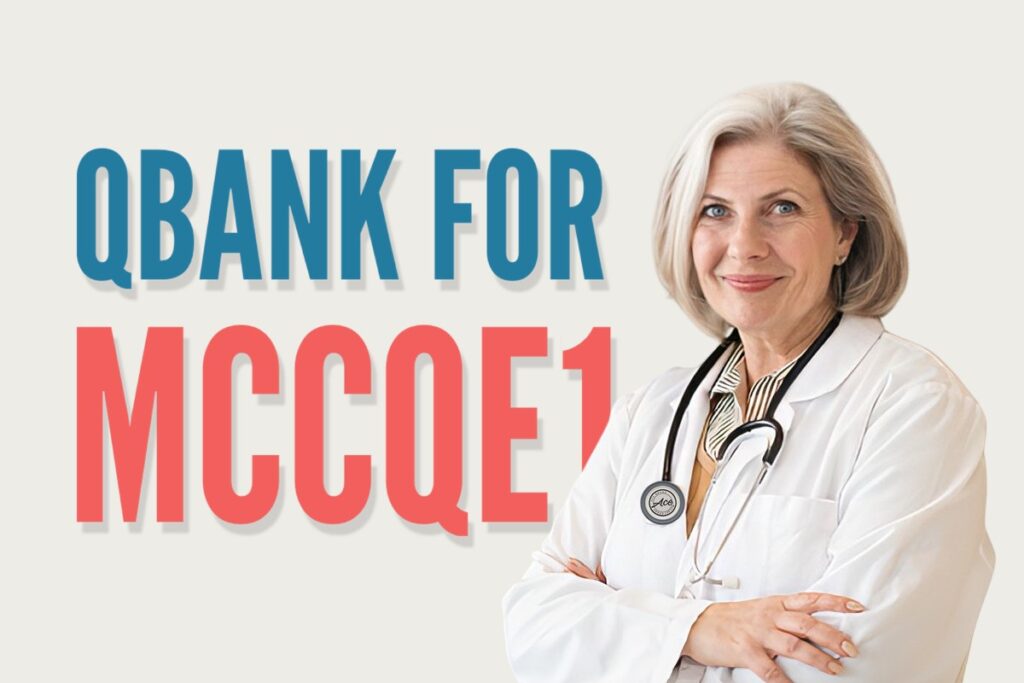
- What Is the Essential MCCQE Part 1 Exam?
- What is The Significance of MCC Objectives in MCCQE1?
- Is There a Top-notch Canada Qbank for MCCQE1?
- MCCQE1 Exam Preparation with Excellent Qbank
- Key Advantages of Using Ace QBank for MCCQE Part 1
- Mind-blowing Features of MCCQE1 QBank
- The Ultimate Choice for Achieving Your Goals
- Key Takeaways
The Medical Council of Canada is responsible for assessing the competence of medical graduates and has outlined the requirements for the Medical Council of Canada Qualifying Examination (MCCQE) Part 1. The exam is seen as a benchmark for assessing the competency of physicians, as it covers medical knowledge, problem-solving and clinical skills important for safe and effective medical practice.
The MCCQE Part 1 is a crucial component in the process of becoming a certified physician in Canada. This examination is one of two that are required to qualify for a medical residency program and ultimately gain certification as a physician in Canada.
The exam is known for being extremely challenging, and it’s important to get the right resources to help you prepare. Making sure that your study materials reflect the most up-to-date Canadian guidelines and regulations is essential for success on the exam. With proper resources, you can become comfortable with the Medical Council of Canada (MCC) objectives covered in the exam and gain confidence as you work towards achieving a high score.
This blog aims to delve into the myriad features of Ace QBank, the leading Canada Qbank for MCCQE Part 1 exam preparation. We are going to take a close look at the question bank, CDM cases, and self-assessments that are provided by this resource and we are going to investigate how they might be helpful in assisting you in preparing for the MCCQE Part 1 exam.
With a professional tone and a commitment to providing detailed insights, we will provide a thorough overview of the Ace QBank. First, the question bank and its numerous benefits. Next, we will look more closely at the CDM cases and their importance in preparing for the exam. Finally, we will discuss the self-assessment feature and how it can help you shake your nerves before the exam.
You will have a complete grasp of the outstanding resources that Ace QBank provides for MCCQE Part 1 exam preparation by the time you reach the end of this article. So, let’s get started, and make sure we do well on that exam!

What Is the Essential MCCQE Part 1 Exam?
The MCCQE Part 1 is a standardized computer-based exam that assesses candidates’ medical knowledge and clinical decision-making skills. The exam comprises two sections, with the first consisting of 210 multiple-choice questions in the morning and the second comprising 38 Clinical Decision Making (CDM) cases in the afternoon.
The exam takes approximately an entire day to complete and is offered by the Medical Council of Canada four times a year, both in Canada and abroad at Prometric Centres.
This high-stakes examination is designed to evaluate candidates’ knowledge of general medical science, clinical skills, and ability to diagnose, investigate, and manage common clinical conditions. So, it is an important step for physicians seeking to practice medicine in Canada.
The MCCQE1 is an essential tool for maintaining high healthcare standards in the country and making sure that physicians in Canada possess the necessary skills and knowledge to provide safe, effective, and high-quality patient care.
On the other hand, it opens up opportunities for further education and professional growth, as passing the exam is a prerequisite for admission into postgraduate medical training programs in Canada and obtaining a full medical license.
MCCQE1: Question Types
The MCCQE1 includes various question types designed based on the MCC objectives and in line with CanMEDS and the latest Canadian guidelines and recommendations. These questions test the candidate’s understanding of medicine and ability to apply theoretical knowledge to clinical scenarios.
Questions can range from multiple-choice questions to short-menu and write-in-answer questions of clinical cases in the CDM part.
Multiple-choice questions (MCQ) | Clinical Decision-Making (CDM) Cases | |
These are single-answer questions with four to five options to choose from. Candidates must exclude all irrelevant answers and select the correct answer, thereby testing their medical knowledge and problem-solving skills. | Short-menu questions | Write-in-answer questions |
These questions consist of a list of options based on clinical scenarios. Candidates must select the correct options to demonstrate their clinical skills and ability to manage and treat patients. | These are questions where candidates must type in the blank the correct answer with the appropriate phrase, generic name of medication, and without spelling mistakes based on clinical scenarios. | |
The main point is that when it comes to the MCCQE1 exam, it is important to recognize that all questions are of equal importance, and omitting any type can significantly impact the final score.
Fortunately, the absence of a negative score in exams can have both positive and negative implications. On the one hand, it allows candidates to answer all the questions in the multiple choice questions (MCQ) section, which is a good thing.
However, candidates who select more options than are instructed by clinical case questions run the risk of losing a score in the Clinical Decision-Making (CDM) sections of the exam. This is because the CDM segment evaluates candidates based on how well they make clinical decisions. So, it is imperative to choose the correct number of options and follow the instructions meticulously.
Additionally, it is essential to ensure that none of the options chosen in the CDM section cause any harm to the virtual patient, as this could result in a score of zero, regardless of the number of correct options chosen.
Comprehending the different types of questions is essential to prepare effectively for an exam. The goal is to eliminate any unexpected surprises that may hinder performance and have a better chance of success on exam day.
This can be done by becoming familiar with the exam’s format, practicing answering similar questions, and developing a strategy to answer them within the allotted time. This approach will enable individuals to cover the entire MCC objectives and perform to the best of their abilities.

What is The Significance of MCC Objectives in MCCQE1?
The Medical Council of Canada’s objectives serve as a critical foundation for the MCCQE1 exam. These objectives are intended to ensure that graduates of medical schools are equipped with the information and abilities required to provide patients with safe and effective treatment.
When assessing medical graduates, the Medical Council of Canada (MCC) utilizes both multiple-choice questions and clinical cases. However, these evaluations are not only based on the MCC objective but also on the MCC blueprint.
While these two terms may seem indistinguishable at first glance, they play distinct roles in ensuring that medical graduates are meeting the required competencies. The MCC objective refers to the overall goal that the medical student or resident is trying to achieve, while the MCC blueprint acts as a guide to help them reach that goal.
Candidates preparing for the MCCQE1 exam must have a comprehensive understanding of the MCC blueprints and be able to cover the objectives effectively to achieve success in the exam. In contrast, the MCC blueprint is a separate topic that will be discussed in more detail in a subsequent blog post.
The MCC objectives are a list of essential topics organized by the Canadian Medical Education Directive for Specialists Framework, or the CaMEDS Framework. The framework has seven roles that are designed to encompass the different aspects of medical practice, including patient care, communication, collaboration, and leadership and emphasizes the importance of patient-centred care and ethical practice in all clinical encounters.
Overall, a thorough understanding of the MCC objectives and the CanMEDS framework is essential for candidates who aspire to pass the MCCQE1 exam. These objectives and frameworks serve as the guidelines for the exam and provide the basis for evaluating a candidate’s knowledge and skills. Therefore, it is imperative that candidates choose a question bank for exam preparation that covers these objectives.
A qbank with a comprehensive set of practice questions aligned with the MCC objectives helps candidates to properly prepare for the exam and identify areas that need further improvement.

Is There a Top-notch Canada Qbank for MCCQE1?
Yes, for those preparing for the MCCQE1 exam, there is a Canadian Qbank available that can greatly assist in achieving success. The Ace QBank is a highly regarded and top-rated tool that provides comprehensive and effective preparation for this important exam.
With a vast array of practice questions ad clinical cases designed based on the MCC objectives and detailed explanations, this Qbank is designed to help test takers thoroughly understand the medical concepts and objectives covered on the exam.
The features provided by Qbank are specifically designed to enhance the retention and recall of test-takers. The platform offers a plethora of flowcharts and summary tables that simplify complex medical concepts, as well as diagnostic and management steps that allow for a more comprehensive understanding of the material.
Additionally, it offers custom illustrations that emphasize key points, which ultimately make it easier to remember the essential information on exam day. These features are critical to success, as they provide a comprehensive and accessible study aid that can help candidates prepare thoroughly and effectively for their exams.
With an emphasis on simplification and retention, Ace QBank is a valuable tool for anyone seeking to excel in the medical field. So, if you’re serious about passing the MCCQE1 exam, then Ace QBank is a no-brainer.
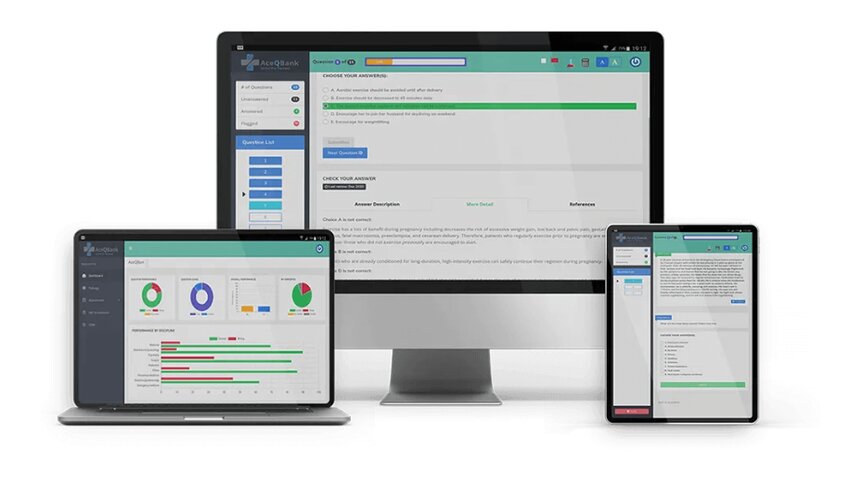
MCCQE1 Exam Preparation with Excellent Qbank
When it comes to preparing for the Canadian qualification exam, there is no resource more valuable than Ace QBank. The question bank offers a wealth of high-quality multiple-choice questions and clinical cases designed to help candidates reinforce their knowledge, identify areas of weakness, and boost their exam performance.
What makes the Qbank unique is its focus on the MCC objectives. This means that all questions and clinical cases are designed to cover the objectives comprehensively, ensuring that you have full comprehension of the material you need to know for the exam. This approach is particularly useful, given the vast scope of the MCC objectives and the need for a focused and efficient study strategy.
Ace QBank’s explanations are grounded in evidence-based medicine, which means that the resource provides the latest, most reliable, and up-to-date information. The explanations are aligned with CanMEDS and the latest Canadian guidelines and recommendations, ensuring that you have the most accurate and comprehensive information at your fingertips.
Additionally, the explanations are regularly updated to reflect any changes in guidelines and recommendations, meaning that you can be confident that you are prepared with the most current information.
The question bank’s focus on the MCC objectives provides comprehensive coverage of all the relevant topics that you will need to be familiar with for the exam, while the evidence-based medicine approach and regular content updates ensure that you can trust the information you are studying. This combination of factors gives you an edge in your exam performance, allowing you to feel fully equipped and confident in your preparation.
Medical graduates studying for the MCCQE1 exam have a challenging task ahead of them. This is an exam that tests their knowledge, skills, and abilities in a comprehensive manner. It requires a thorough understanding of the theoretical concepts as well as the ability to apply them to real-world patient scenarios. To succeed in this exam, candidates must demonstrate their ability to remember, critical thinking, and clinical reasoning skills.
The best way to prepare for this exam is by practicing with high-quality multiple-choice questions and clinical cases that target the CDM component of the exam.
One of the most valuable resources available to candidates preparing for the MCCQE1 exam is Ace QBank. The Qbank is a comprehensive collection of multiple-choice questions covering all medical specialties and topics based on MCC objectives.
What sets this question bank apart from others is its exceptional quality; it goes beyond mere memorization of facts and requires candidates to apply their knowledge to practice patient care scenarios. This approach challenges candidates to think critically about each question, analyze the information provided, and make an informed decision based on their clinical judgment.
Practicing with the Qbank is an excellent way for candidates to hone their skills and increase their confidence in their clinical judgment. The questions are designed to mimic the real exam so candidates get a feel for the format and the types of questions they can expect. This familiarity is essential in reducing anxiety and increasing confidence on exam day.
Moreover, applicants are given in-depth explanations for each question that is included in the Qbank. This enables candidates to learn from their mistakes and comprehend the logic behind the answers that are considered correct.
Another essential component of the MCCQE1 exam is the CDM or Clinical Decision Making component. This component is designed to test candidates’ ability to manage and make sound clinical decisions for common medical conditions.
To prepare for this component, candidates need to practice with clinical cases that simulate real-world patient scenarios. The Qbank includes an extensive collection of clinical cases specifically targeting the CDM component of the exam. These cases challenge candidates to think critically about patient care and make informed decisions based on their clinical judgment.
Candidates may improve their diagnostic skills and their ability to think critically about patient care by working through these clinical scenarios. This is a good opportunity for candidates to enhance these skills. Each case presents an in-depth analysis of the patient’s medical history, as well as the findings of the physical examination and the laboratory results.
Candidates are required to do an analysis of this data, formulate a diagnosis, and devise a treatment strategy. These cases also require candidates to consider the patient’s unique circumstances and preferences, making them more realistic and challenging.
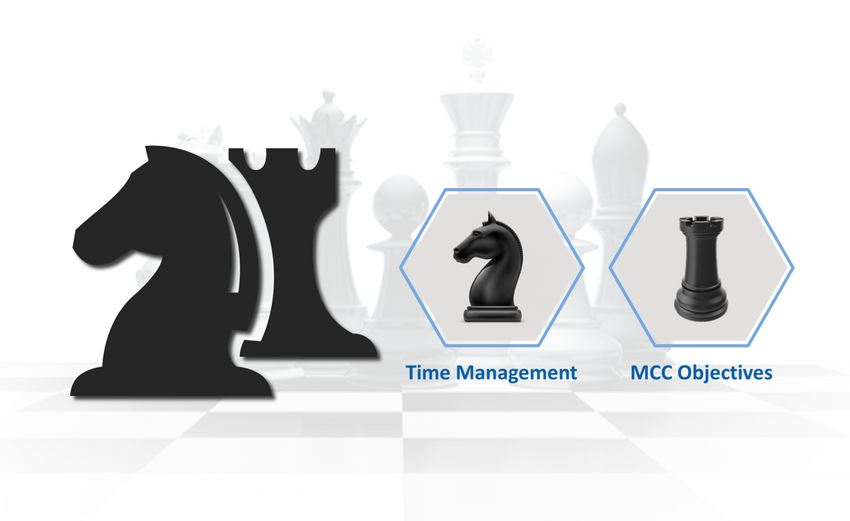
MCQ for MCCQE1
Medical graduates who are preparing for the MCCQE Part 1 exam have a lot of work cut out for them. This is a rigorous exam that tests a candidate’s knowledge and clinical skills and requires them to apply their knowledge to solve presented clinical problems.
Due to the fact that the exam encompasses such a large number of different subject areas, it may be challenging for them to know where to begin their preparations and how they can effectively cover all of the objectives that have been provided for the exam.
Fortunately, Ace QBank is a valuable resource that can help candidates to effectively cover all the objectives efficiently. The QBank is an online question bank that has been designed based on the MCC objectives and is regularly updated. The questions in the question bank are created by medical experts, ensuring that they are accurate, up-to-date, and reflective of current medical practice in Canada.
The QBank offers over 2500 high-yield questions that can help candidates to test their knowledge and identify areas where they need improvement. The questions are thoughtfully designed to help candidates seamlessly prepare for their upcoming qualification exam. The question bank also has a user-friendly interface that allows candidates to create custom question blocks based on their study plan.
One valuable feature of the QBank is its focus on accuracy and relevance. This is important because medical practice is constantly evolving, and candidates need to be prepared to handle the latest Canadian guidelines and recommendations.
Another valuable feature is its focus on time management. The time mode in the question blocks allows candidates to practice their time management skills. Candidates will be able to better prepare themselves for the time constraints that will be placed on them during the real examination if each question block has a predetermined time restriction. This feature is particularly important for candidates who need to develop better strategies for answering questions efficiently.
Similarly, the tutor mode in the question blocks allows candidates to review their answers immediately after answering each question. This provides an opportunity to cover disciplines that candidates feel less confident in and receive instant feedback on their performance. They can also access detailed explanations and references for each question in tutor mode, helping them to understand the concepts and topics more thoroughly.
In addition, the question bank allows candidates to create custom question blocks based on their study plan. For instance, if a candidate wants to thoroughly prepare for the exam and cover all the topics in-depth, they can create a set of questions from a particular discipline in question blocks in either time or tutor mode. This approach provides candidates with a more comprehensive way to prepare for the exam. By practicing questions from disciplines that they need more insight into, they can test their knowledge across a wide range of questions and identify areas where they need to improve.
Basically, the question bank provides a great way for candidates to effectively cover all objectives efficiently; the only thing that a medical graduate who is preparing for the MCCQE1 exam has to do is to create question blocks in either time or tutor mode and start practicing with over 2500 high-yield questions that are designed based on the MCC objectives and are regularly updated.
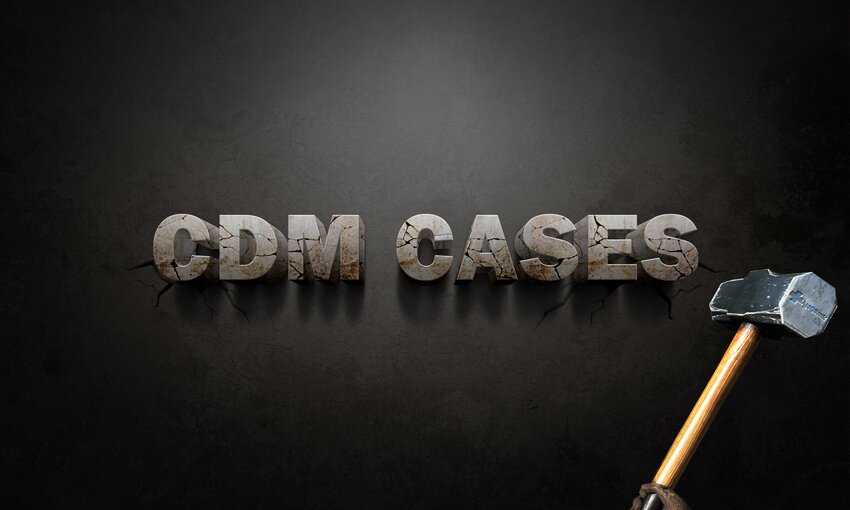
CDM Cases for MCCQE1
The Clinical Decision Making (CDM) element of the MCCQE Part 1 is an essential exam component that measures a candidate’s ability to make clinical decisions, assess severity, and correctly manage common medical diseases. This portion of the exam is designed to determine whether or not a candidate is qualified to practice medicine in Canada.
The interesting point to mention about CDM cases in the MCCQE1 exam is that those clinical cases are equally important as MCQs. However, the scoring system for the clinical cases is different in the exam.
While there is no penalty for selecting an incorrect answer in the multiple-choice questions (MCQ) section of the exam, it is important to note that it is possible to obtain a low score or no score at all in the clinical decision-making (CDM) part of the exam. All it takes is either selecting more options than required or choosing one incorrect answer from the given options.
The CDM part of the exam is more about precision and the ability to follow direct instruction while requiring candidates to demonstrate their ability to make sound clinical decisions for virtual patients based on evaluations of given clinical scenarios.
The questions in CDM cases are of two types: short menu questions and write-in questions. Short menu questions require candidates to select their answers from a list of options, while write-in questions require candidates to type in their response(s) in the answer box provided.
Both types of questions are equally important in determining the overall exam scores, and candidates should pay equal attention to the instructions for each type of question. While short-menu questions may seem more straightforward, they still require careful consideration of the options presented and a thoughtful analysis of the given scenario.
On the other hand, write-in questions require candidates to provide their answers in their own words, which can be more challenging as it requires a deeper understanding of the clinical scenario while avoiding any spelling mistakes. It is essential to read the question carefully and ensure that the answer provided is relevant to the scenario presented.
The good news is that Ace QBank CDM cases for the MCCQE1 exam preparation offer both write-in and short menu questions to help medical graduates properly prepare for the CDM part of the exam.
The clinical cases are designed based on the Medical Council of Canada’s objectives and represent the common medical conditions that a Canadian physician will see in an office on a daily basis.
Furthermore, medical experts design the CDM cases to be thought-provoking and challenging at the same level as the actual exam in order to encourage candidates to use their medical knowledge and clinical skills in solving the presented clinical problems, thereby developing and improving their critical thinking.
However, without a question bank, one may find the CDM cases super challenging because most of the diagnostic criteria, management steps, and appropriate treatment of common medical conditions are well explained in detail in the explanation section of the questions in the question bank.
That’s not all; summary tables and flow charts in the question bank have simplified diagnostic criteria, management steps, and appropriate treatment, and custom illustrations are added to visualize these medical conditions and enhance retention.
It’s recommended to save the CDM cases after you have finished practicing with the question bank. This is because the CDM cases are designed to test your ability to integrate your knowledge and apply it to clinical scenarios, which requires a solid foundation of the Medical Council of Canada’s objectives.
After working through the question bank in its entirety, you will have a deeper comprehension of the medical concepts and objectives that are likely to be tested. You will be able to tackle the CDM cases with more confidence as a result of this.

MCCQE1 Self-assessments
For medical graduates in Canada who are seeking a medical license, the Medical Council of Canada Qualifying Examination Part 1 is crucial. The exam covers a wide range of medical topics and is bound to test candidates, clinical skills and communication abilities. Therefore, Candidates must ensure they are well prepared before sitting the exam.
On the other hand, the question that spins in the head of many applicants and hunts them during exam preparation is, “Am I ready for the exam?” and nothing is more vexing and annoying than not knowing.
One of the best ways to assess one’s level of preparedness for the MCCQE Part 1 is through self-assessment. Ace QBank MCCQE1 self-assessments are a true simulation of the actual exam. It is designed based on the MCC objectives and consists of 120 hand-pick multiple-choice questions by medical experts to accurately gauge readiness for the exam.
The best thing about the MCCQE1 mock exam is that the questions are distinct from the main question bank, so if you happen to have access to a premium package or even a basic question bank-only package, for that matter, you would not end up answering or seeing the same question over and over again.
The distinct set of questions from the main question bank is a smart approach because it accurately assesses candidate readiness for the exam and indicates the areas requiring more attention. Assessments provide an excellent opportunity for candidates to evaluate their strengths and weaknesses and identify the areas that require more attention.
Properly managing time on the MCCQE1 exam under pressure is a crucial skill needed for success. Candidates must be able to prioritize questions and manage their time effectively to ensure they can answer all questions within the allotted time. By taking timed assessments, candidates can test their time management skills and see if they can effectively manage and allocate their time to each question.
Fortunately, the timed feature of the assessments serves as an invaluable tool for those seeking to ace the MCCQE1. Not only does it provide candidates with a true simulation of the exam, but it also grants them the chance to develop and fine-tune their time management skills and test-taking strategies.
Moreover, the timed feature of the assessments also allows candidates to get a feel for the exam format and timing. Candidates can familiarize themselves with the time allotted for each question of the exam. This can help alleviate test anxiety and enable candidates to confidently approach the exam.
In addition to time management, test-taking strategies are also essential for achieving a high score on the MCCQE1. You, as a candidate, must be able to read and understand the questions quickly, eliminate incorrect answer choices, and choose the best correct answer.
Those candidates who have access to the main question bank in the premium or basic package have the opportunity to practice, develop, and fine-tune their test-taking strategy in the timed study mode of the Qbank.
It is recommended that MCCQE1 mock exams are taken several months prior to the actual exam date to allow ample time for addressing any issues that may arise. It is also critical to determine the proper spacing between mock exams, particularly if you want to take more than one self-assessment.
Frequent and closely timed mock exams may not effectively improve skills or identify weaknesses. Therefore, taking mock exams several weeks before the actual exam day is suggested, allowing sufficient time to address the issues highlighted by the mock exam.
A recommended timeframe for taking mock exams is at least a month apart. This provides you with ample time to evaluate your performance, identify areas for improvement, and work on strengthening your knowledge and skills before taking the next mock exam.
Taking mock exams too frequently may lead to burnout or a false sense of confidence. It’s essential to take the time to review your performance, learn from your mistakes, and make necessary adjustments to your study strategy before taking the next mock exam.
Spacing out your mock exams also allows you to monitor your progress effectively. By taking mock exams at least a month apart, you can track your improvement over time and adjust your study plan accordingly.
Every assessment is designed to highlight areas of weakness that require immediate attention. However, if you take an assessment too close to the exam day, you may not have enough time to properly cover those objectives and improve your skills in those areas. This can lead to increased anxiety and worsen the situation.
Moreover, taking assessments in a timely manner allows you to adjust your study plan accordingly. If you identify a particular area where you need to improve, you can focus more on that area and adjust your study plan to ensure you are well-prepared for the exam.

Key Advantages of Using Ace QBank for MCCQE Part 1
Preparing for any examination can be nerve-wracking, but MCCQE Part 1 has, particularly high stakes, and as a medical student or an international medical graduate, passing this exam is a crucial step toward obtaining a medical license in Canada.
A comprehensive and realistic study plan that includes a reliable question bank is essential to achieve success; this is where Ace Qbank comes in.
It stands out as the only Canada Qbank that provides high-quality MCQs and top-notch CDM cases based on the MCC objectives to facilitate exam preparation. What sets the Qbank apart from other question banks is its focus on enabling candidates to prepare effectively for the MCCQE Part 1 exam.
One of the biggest advantages of using Ace Qbank is that it offers a comprehensive and structured approach to exam preparation. Using the Qbank to prepare for the MCCQE Part 1 exam has several advantages. Let’s explore these benefits:
1-Efficient testing
Ace QBank is an effective method for testing your knowledge and determining the areas in which you need more study. With thousands of multiple-choice questions covering a wide range of medical specialties and topics based on the MCC objectives, you can test your knowledge and see where you stand. You can create custom question blocks based on your study plan and focus on areas where you need more practice. This helps you maximize your study time and ensure that you are well-prepared for the exam.
Ace QBank also provides detailed explanations for each question, allowing you to understand the concepts behind the answers and learn from your mistakes. Additionally, the platform tracks your progress and performance, so you can monitor your improvement over time.
Another benefit of Ace QBank is the flexibility it offers. It is a significant advantage for students who have busy schedules or prefer to study at their own pace. Medical graduates are able to study whenever and wherever they have access to an internet connection, allowing them to do so in the convenience of home, while on the road, or even during their lunch breaks at work.
This flexibility also allows students to create a study schedule that works best for them. They can study during the day or at night, for short or long periods, and take breaks whenever needed, and they will benefit from having this amount of control over their study schedule since it enables them to better manage their time and experience less stress.
Furthermore, the ability to access Ace QBank from anywhere means that students can study on the go. They can use their tablets to access the platform, making it easy to fit in study sessions during their daily commute or while waiting in line.
Overall, the flexibility offered by the question bank is a significant benefit for students who want to study on their own terms and on their own schedule. It allows them to study from anywhere, at any time, and for any duration, making it easier to manage their time and reduce stress.
2-Reliable resource
For the purpose of being accurate, current, and reflective of Canadian medical practice, medical experts created questions. You can be confident that the questions you are practicing with are of the highest quality and will prepare you for the actual exam.
The questions are also designed to cover a wide range of topics and difficulty levels, allowing you to gauge your current level of knowledge and identify areas where you may need to focus your studying.
In addition, by practicing with these high-quality questions, you can improve your chances of success on the Canadian qualification exam and feel more confident in your ability to practice medicine in Canada. It is important to note that while practicing with these questions can be helpful, it is also important to supplement your study with other resources, such as textbooks, to ensure a well-rounded understanding of medical practice in Canada.
3-User-friendly interface
The interface has a clear and concise layout and is easy to navigate and understand. The question bank offers two study modes, Time and Tutor modes.
The time mode in the question blocks allows you to practice your time management skills, which is essential for the actual exam. The tutor mode provides instant feedback on your performance, but in contrast to the time mode, it provides access to detailed explanations and references for each question immediately after answering the question. This helps you learn from your mistakes and understand the reasoning behind the correct answers.
The interface is designed to simplify access and allow switching between these modes and helps to improve the user experience, reduce errors and frustration, and increase productivity.
The dark mode option makes the interface easy on the eyes. This means users can switch to a mode where they feel the content is not too bright or distracting and spend long hours reading content and studying.
It is a responsive and easy interface to work with, allowing users to accomplish their tasks without getting frustrated or confused.
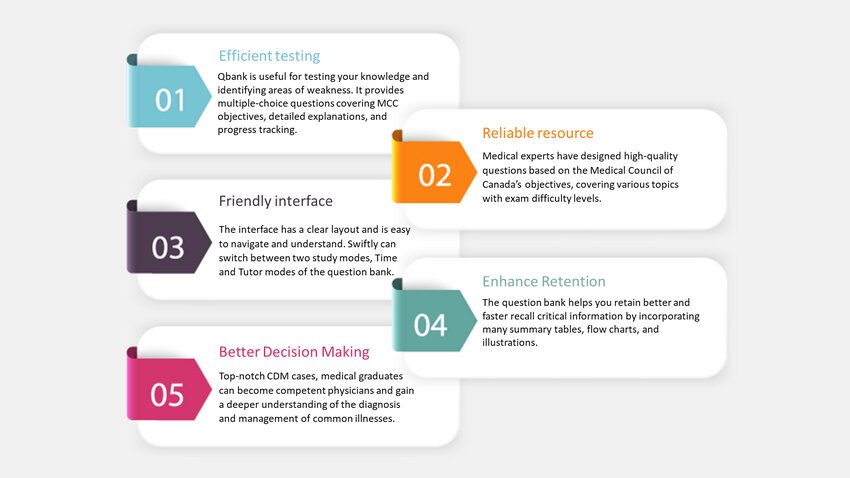
4-Enhance Retention and Faster Recall
The question bank helps you retain better and faster recall critical information by incorporating many summary tables, flow charts, and illustrations.
These tools help to simplify and organize complex medical concepts, making them easier to understand and remember. By presenting information in a more visually appealing and engaging way, a candidate will be better able to absorb and recall the material.
The entire medicine is connected in reality. However, this connection is not visible unless the learned concepts are actively recalled. These aids can help candidates make connections between different MCC objectives, which can enhance their overall understanding and help them better cover and faster prepare for the exam.
On the other hand, incorporating these summary tables, flow charts, and illustrations into question banks can help candidates review the need-to-know medical concepts and key points quickly and refresh their memory before the exam. This helps them feel more confident and better prepared.
5-Better Decision Making
Ace QBank offers top-notch clinic cases that help you properly prepare for the Clinical Decision-Making (CDM) part of the MCCQE Part 1 exam. These cases challenge you to diagnose and manage common medical conditions.
As a medical graduate, you strive to ace your exams and become a competent physician. The CDM cases offered by QBank are an excellent resource to help you achieve this goal. These cases are designed to cover a wide range of common medical conditions, allowing you to develop a deep understanding of the diagnosis and management of common illnesses.
By practicing with these cases, you will gain the skills necessary to approach clinical scenarios with confidence. You will learn to gather relevant information, diagnose accurately, and develop effective treatment plans. This will help you pass the MCCQE Part 1 exam and prepare you for real-life patient encounters.
With Ace QBank’s CDM cases comprehensive and effective approach, you can be confident in diagnosing and managing common medical conditions and by working through these cases, you can develop your diagnostic skills and improve your ability to think critically about patient care.

Mind-blowing Features of MCCQE1 QBank
Ace QBank is a comprehensive study tool developed to assist medical graduates in their preparation for the MCCQE1. It provides a multitude of features, such as flow charts, summary tables, custom illustrations, summary points, and references, among other things.
The features of the Qbank work together to improve understanding of the MCC objectives and are designed to provide deeper insight into the MCC objectives while enhancing the recall of the essential key points on exam day to increase their chances of passing the exam.
In-depth explanations
The Qbank provides candidates with detailed explanations for each question, enabling them to understand the reasoning behind the correct answer and learn from their mistakes. These explanations are based on evidence-based medicine and are frequently updated, ensuring that the platform remains reliable and up-to-date.
During the process of reading the question explanations, candidates will notice that key points are highlighted to emphasize their significance. Furthermore, the explanations often include related pictures and additional information to make it easier for candidates to understand the concepts and enhance their recall of the key points. This feature is particularly helpful for visual learners or those who benefit from additional context when studying.
The Qbank’s detailed explanations are specifically designed to help candidates gain a deeper understanding of the topics and concepts on the exam. The explanations are evidence-based and updated regularly to ensure that candidates are receiving the most reliable information available. By relying on the Qbank for thorough explanations, candidates can be confident that they are receiving the best possible preparation for their upcoming exam.
Additionally, the question bank’s emphasis on highlighting key points and incorporating visual aids further enhances the learning process and reinforces key concepts. This feature makes it easier for candidates to remember important information and apply it effectively during the exam.
Flow charts and summary tables
One of the standout features of the question bank is its detailed explanations, which are enriched with flow charts and summary tables.
Flow charts and summary tables are essential tools that help candidates organize and retain information better. During the exam, when adrenaline is pumping, these visual aids can be extremely helpful in recalling key concepts and details quickly to answer questions correctly.
The flow charts included in the question bank are thoughtfully designed to help candidates navigate complex medical concepts. They provide a logical sequence of steps to follow, making it easier to remember the best next steps in management or diagnosis.
With the help of flow charts, candidates can break down complex concepts into manageable pieces of information and get a clear understanding of how they relate to each other.
However, the importance of flow charts goes beyond exam preparation. In real-life medical practice, flow charts are powerful tools for clinical decision-making. They allow healthcare professionals to visualize complex information and guide them through a clear path to make evidence-based decisions.
Ace QBank highly values the role of flow charts in clinical decision-making. Therefore, we strongly recommend candidates activate and practice clinical cases after completing the question bank.
This approach ensures that candidates have meticulously read and reviewed all the flow charts and make the most of clinical cases, and by doing so, they will be well-equipped with the necessary skills to excel.
Similarly, summary tables are especially beneficial for candidates preparing for the MCCQE1 exam as an excellent way to condense large amounts of information into a single, easy-to-digest format. They are designed to provide readers with a snapshot of the most critical aspects of a topic and allow readers to quickly gain a comprehensive understanding of important details of high-yield topics.
They offer a concise overview of the most important material in brief, which serves as a reference guide for recalling essential key points in a matter of minutes.
In addition, their straightforward design offers candidates an efficient way to quickly review high-yield topics at the last-minute review.
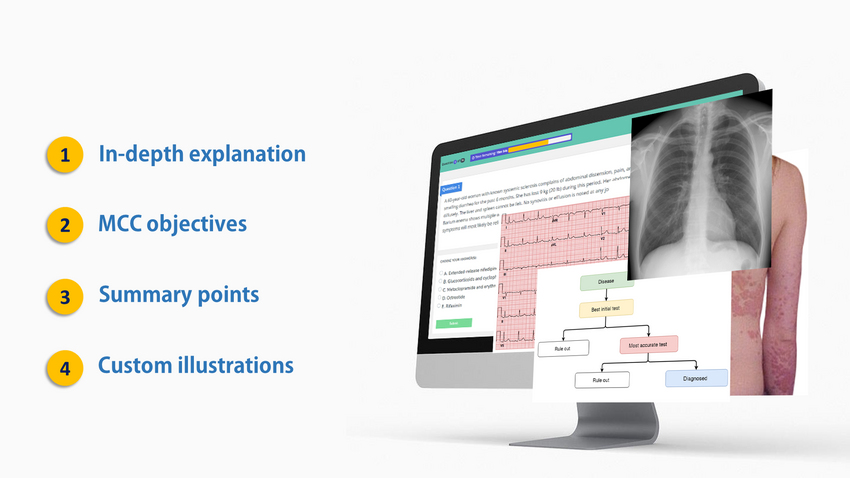
Custom illustration
There are medical concepts that are complex and difficult to understand, let alone recall. Ace QBank’s illustrations are created with a specific goal in mind, to simplify complex medical concepts and to improve retention and enhance recall on exam day, ultimately leading to better overall performance.
These illustrations take into consideration the different learning styles of candidates and are created to be visually appealing and easy to understand, making it easier to remember the essential key points about various medical conditions.
These illustrations are not just random images but were created with a clear purpose. They are intended to highlight the most important aspects of a medical condition, making them easier to recall when it comes time to take the exam.
In essence, these illustrations are an integral part of the question bank, providing candidates with an efficient and effective way to retain important medical concepts and boost their exam performance.
Summary points
One of the most challenging components of exam preparation is efficiently utilizing the available time to thoroughly review all the MCC objectives. To help candidates better focus their review efforts and aid in recalling essential facts, Ace QBank incorporates summary points at the end of each question.
The summary points are designed to help focus on the most vital information and aid in last-minute review before exam day, as they help to reinforce the main concepts presented in the questions. This allows candidates to focus on the most critical information and, when used in the days leading up to an exam, can help to improve overall performance.
It is essential to emphasize that the use of summary points is not intended to serve as a replacement for in-depth study and the familiarization of oneself with medical concepts. Instead, it should be used in conjunction with a detailed explanation of each concept to reinforce and review the material that has been studied.
Additionally, by reviewing these summary points periodically, candidates will gradually build a better understanding of the material and be able to recall it more effectively.
Ultimately, summarizing is a powerful and effective way to enhance understanding of medical concepts, quickly review key points and improve performance when studying for the Canadian qualification exam.
References
When preparing for the Medical Council of Canada Qualifying Examination Part 1, the reference section of the question bank does not always receive the attention it merits. However, this is a mistake as there are many invaluable resources found within this section that can be of great assistance during the exam preparation process.
Let me explain how it can be an invaluable asset in the MCCQE1 exam preparation. It serves several purposes; first, it emphasizes and helps reinforce the objectives determined by the Medical Council of Canada (MCC). Second, this section allows candidates to monitor their progress in properly covering these objectives.
Additionally, it provides numerous additional resources for further study to support candidates in preparation for the exam. Let’s take a closer look at all these features.
Facilitates preparation:
The reference section of the question bank gives candidates a comprehensive and effective way to track their progress. By indicating corresponding MCC objectives, candidates can gauge where they stand and see which areas need more focus. This creates the opportunity for a tailored study plan that allows them to monitor their advancement as they build competence in the necessary subjects.
Tracking the MCC objectives:
The reference section of the MCCQE1 exam plays a vital role in the successful preparation of candidates by providing a clear connection between the exam objectives and the topics covered in the exam.
It provides the corresponding MCC objective for each question that has been covered, makes it easier to keep track of progress, and helps identify the objectives that still need to be covered to maximize the chances of success.

The Ultimate Choice for Achieving Your Goals
When it comes to preparing for the Medical Council of Canada Qualifying Examination Part 1, finding the right study resources can make all the difference in your success. That’s where Ace QBank comes in.
Ace QBank is a comprehensive online question bank that offers thousands of practice questions and detailed explanations designed to help you identify your strengths and weaknesses. With Ace QBank, you can customize your study plan and track your progress, ensuring that you are fully prepared for the exam.
Let’s explore why Ace QBank should be your go-to resource for comprehensive and effective MCCQE1 exam preparation.
Comprehensive Question Bank
One key factor that sets Ace QBank apart from other study materials is its extensive collection of high-quality questions specifically designed for the MCCQE1 exam. With over 2,500 questions designed based on the Medical Council of Canada objectives, you can be confident that you will encounter questions representative of those on the actual exam.
Furthermore, each question is accompanied by detailed explanations and rationales, ensuring that you learn how to answer individual questions and apply these concepts in real-world situations.
Questions Crafted by Experienced Professionals
Ace QBank takes pride in offering high-quality content created by experienced professionals who are well-versed in Canadian medical education and testing standards. These experts have meticulously crafted each question to mirror the level of difficulty found on the actual examination.
Additionally, QBank provides detailed explanations for each question, allowing users to understand the correct answer and the reasoning behind it, further enhancing their knowledge and test-taking skills.
Moreover, the expertly-designed questions also provide a simulated exam experience that helps users to familiarize themselves with the format and structure of the actual exam. So, when it comes time to take the actual exam, this can make you feel less anxious and more confident.
By investing time in practicing these expertly-designed questions, you will be better prepared to tackle complex clinical cases during your exam, ultimately improving your performance and chances of passing.
Customizable Study Experience
Question bank offers a user-friendly interface that allows you to customize your study experience according to your unique needs. You can create personalized question blocks (quizzes) based on specific subjects or areas where you need more practice, enabling targeted revision and efficient use of your limited study time.
You can create quizzes based on your study plan in your preferred study modes. This means that you can study in any mode you like, such as time or tutor mode. Plus, you can even create quizzes from questions you got wrong in the past, so you can be sure to focus on the areas you need to improve on, giving you the opportunity to get the most out of your time.
Track Your Progress
Practice alone is not enough to ensure success on the MCCQE1 exam; you must also track your progress and pinpoint the areas of your performance that still need work. Ace QBank’s built-in performance analytics can help you achieve this goal by providing detailed statistics on your performance in various disciplines.
With this information, you can tailor your studying to focus your efforts on addressing the areas that need the most work more effectively, so you can maximize your chances of success on the MCCQE1 exam.
Regularly Updated Content
To stay current with evolving medical knowledge and testing standards, Ace QBank routinely updates its question bank and CDM cases with new questions and clinical cases and revises existing content based on user feedback or medical expert review.
This commitment to maintaining up-to-date content ensures that you will always have access to relevant, high-quality practice questions that reflect the most recent changes in Canadian guidelines and recommendations.

Evidence-Based Medicine Explanations
Regularly updated comprehensive explanations for each question help candidates grasp essential medical concepts vital for exam success.
Comprehensive explanations for each question are crucial in assisting candidates in grasping essential medical concepts that play a significant role in achieving exam success.
These detailed explanations are written in a manner that is easy to comprehend, making it accessible for candidates from various backgrounds and levels of understanding. This approach enables medical graduates to effectively absorb the information provided, aiding them in retaining key knowledge that will be invaluable during their examination period.
These thorough explanations will equip candidates with the necessary knowledge required not only to pass their exams but also to excel and thrive throughout their medical careers. The wealth of information derived from these clarifications prepares aspiring medical professionals for real-world situations and helps them establish a strong foundation upon which they can build upon as they progress further into their chosen field.
The team of medical experts at Ace QBank is dedicated to providing comprehensive explanations for each question in order to assist candidates in grasping essential medical concepts.
These explanations serve as an indispensable tool for those seeking success in their medical careers. Our easily digestible elucidations pave the way for exam success and long-term career growth within the competitive field of medicine.
It is important to have a strong foundation in medical knowledge, and our team works tirelessly to provide the resources necessary for our candidates to succeed. We are proud of the commitment to excellence and strive to provide the best possible resources to support the success of medical graduates using the question bank.
Two Study Modes
In the Qbank, there are two distinct study modes available for individuals preparing for the MCCQE1 exam, each specifically designed to serve a unique purpose in ensuring effective and efficient exam preparation.
The first of these modes is the tutor mode, which offers comprehensive explanations and valuable feedback on every question presented. This mode enables the user to learn from any mistakes they might make, thereby bolstering their understanding of the subject matter. By providing detailed responses, it ensures that users can identify areas where they may need to focus more attention or seek additional resources.
On the other hand, the timed mode is structured to put users under pressure by simulating actual exam conditions. This mode helps users gain experience with time management and develop a better understanding of how to pace themselves during real-life examination scenarios. Practicing under such constraints can boost one’s confidence and ultimately lead to improved performance on test day.
It is recommended to use both modes in conjunction with each other to maximize the benefits of the Qbank. The tutor mode can be used initially to strengthen medical knowledge, followed by the timed mode to simulate exam conditions and improve time management skills.
Visual Learning Aids
With the inclusion of hundreds of comprehensive summary tables, detailed flow charts, and exceptional high-quality illustrations, medical graduates preparing for the MCCQE1 exam are able to effectively improve their recall of crucial key points and vital information on the day of their examination.
These visual aids have been specifically designed to facilitate a deeper understanding of complex concepts and clearly depict the relationships between various objectives. As effective tools for organizing vast amounts of information, these aids significantly enhance and elevate the overall learning experience for candidates.
Moreover, these visual aids prove to be particularly beneficial for those visual learners who may find it challenging to retain essential information solely from textual sources. These students can also excel in grasping and retaining important knowledge by offering an alternative approach.
Additionally, these summary tables, flow charts, and illustrations can act as an invaluable quick reference guides for all students who might need to review or refresh their understanding of specific material swiftly. This resource caters to different learning styles and supports efficient revision during time-sensitive periods leading up to exams.
Top-Notch CDM Cases
The Medical Competency Criteria served as the foundational basis for creating and developing Clinical Decision Making (CDM) cases. These cases depict a range of common medical issues that a Canadian physician would likely encounter and need to address on a daily basis while providing care to their patients.
These clinical scenarios present users with challenging and thought-provoking situations that reflect the same degree of difficulty they will face during their examination process. More importantly, these cases are designed to motivate the user to actively apply what they have learned in their medical education to find solutions for the presented clinical problems effectively.
By engaging this approach, users significantly improve their critical thinking abilities, enhance their capacity for making well-informed and sound clinical decisions, and better prepare themselves for tackling the CDM component of the MCCQE Part 1.
Consequently, it serves as an invaluable tool in ensuring that healthcare professionals possess the knowledge and skills necessary to provide optimal patient care within the Canadian healthcare system.
Mock Exams for MCCQE Part 1
The mock exams provided by QBank are meticulously created to simulate the format and difficulty level of the actual MCCQE Part 1 exam, thereby providing candidates with an accurate measure of their preparedness for this crucial test. By offering such a realistic experience, these mock exams enable candidates to gain confidence in their abilities and reduce anxiety levels, ultimately leading to better performance on the actual exam day.
On the other hand, the mock exam questions are carefully crafted to be distinct from the main question bank. These questions are hand-picked by a team of experienced medical experts who ensure that they not only cover all the topics tested in the exam but also accurately measure a candidate’s preparedness. This thorough process guarantees that candidates will be fully prepared to tackle any challenges they may face during the actual exam.
It is essential for candidates to remain calm and focused during their exam day while managing their time wisely. Therefore, taking a mock exam before sitting for the actual test can play a significant role in reducing anxiety and building confidence. Since it helps identify areas of weakness and allows candidates to work on improving those areas before facing the real examination.
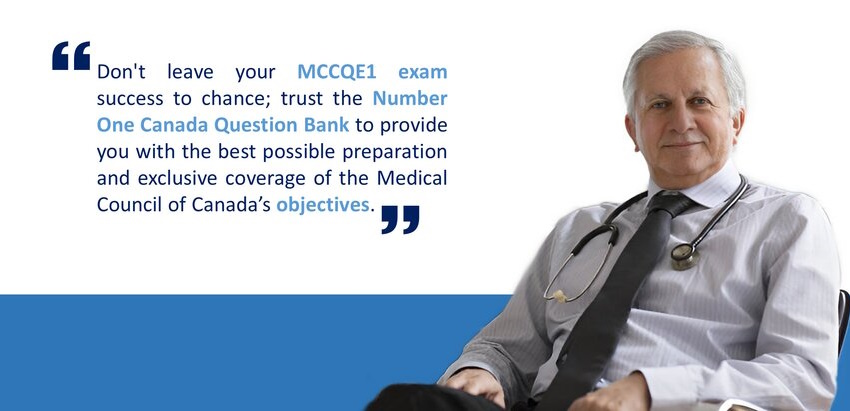
Key Takeaways
The MCCQE1 exam is a critical milestone for medical graduates who want to practice in Canada. This test is intended to examine medical graduates’ ability to meet Canadian healthcare standards. It is a tough exam that needs much study, devotion, and effort.
Utilizing a comprehensive Canadian question bank to properly prepare for the MCCQE1 exam is the most effective way to study for the exam, which is why it is the best approach to prepare for the exam.
If you are gearing up to take a Canadian qualification exam, having access to top-quality practice materials that align with Canadian healthcare standards is crucial. That’s why Ace QBank, created by Canadian physicians, has been specifically developed to meet these requirements and help you succeed.
In other words, Ace QBank is an exceptional resource that’s tailor-made to help medical graduates prepare for the MCCQE1 exam.
From high-yield questions to mock exams, in-depth explanations, flow charts, and summary tables, Ace QBank has it all, and the questions and clinical cases cover all the objectives of the Medical Council of Canada (MCC) exams, so you can feel prepared and ready to succeed.
The Qbank will not only help you understand medical concepts better but also help you identify your areas of weakness. This way, you can concentrate your studies on your weak areas and maximize your chances of success.
Ace QBank is confident in the content’s quality and the efficacy of our approach. Don’t just take our word for it!
Check out the free demo and experience for yourself on how Ace QBank can help you achieve your goals of passing your licensing exams with flying colours.


